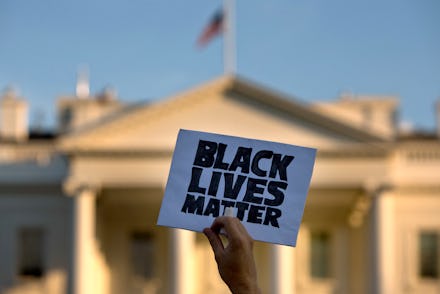What is Black Lives Matter? Google searches show many think it's a terrorist organization

Judging by Google's autocomplete function, a lot of people either believe or are wondering if Black Lives Matter is a terrorist or hate group.
When you begin to type in a query, asking Google "is Black Lives Matter ...," Google suggests the inquiry end with "a hate group," "a terrorist group," "anti semitic" or "a non profit organization."
"Search predictions are possible search terms you can use that are related to the terms you're typing and what other people are searching for," Google explains — which means a lot of people using the search engine have some serious concerns about the movement.
Racial justice advocates are acutely aware of Google's potentially problematic search function.
"We're in the midst of trying to work with Google about doing something with their search function, which currently allows hate groups to appear high up in the search results," Lecia Brooks, who leads the Southern Poverty Law Center's social justice outreach initiatives, said in a phone interview.
"They've been very receptive and have already made minor changes to the search results for Dr. Martin Luther King," she added.
Here's what BLM really is — and why those wondering if it's a terrorist group are wrong.
BLM emerged as a grassroots movement in response to the 2013 acquittal of 17-year-old Trayvon Martin's killer, George Zimmerman, and an associated trial in which the slain teenager was posthumously accused of being responsible for his own death.
"[It] is a call to action and a response to the virulent anti-Black racism that permeates our society," its website states, and has been fueled by a string of racially-motivated police shootings since its inception.
It has not been classified as a hate group by the SPLC, which tracks hate and extremist groups — unlike its counterpart, White Lives Matter.
Film director and Twitter personality Xavier Burgin used the social platform last month to identify what he believes is the difference between the two groups:
This misconception is a persistent one. BLM remains a chapter-based, decentralized movement, calling for racial justice. Notwithstanding, accusations that it is terroristic appear to have entered the mainstream.
"We don't have to look to the Middle East anymore to find real life evidence of terrorism," Tim Constantine, a Washington Times columnist, wrote in September 2015. "Right here in the United States there is a group called Black Lives Matter."
Mark Potok, SPLC's extremism expert and editor-in-chief of their publication, Intelligence Report, contends racism is at the root of associating BLM with terrorism. "What's driving this misperception is simply a racist response to what is inarguably a civil rights movement," he said in an interview Friday.
Potok explained there may be some outliers who identify with the movement and who partake in violent or disorderly behavior, "but claiming that's reflective of the leadership of the group or that the leadership is somehow pushing for the deaths of white police officers is 100% bogus."
In July, a petition to the White House to classify BLM as a terrorist organization amassed the 100,000 signatures needed in the first month to elicit a response.
"We don't have to look to the Middle East anymore to find real life evidence of terrorism. Right here in the United States there is a group called Black Lives Matter."
However, the White House was unable to even consider the request because the "government does not generate a list of domestic terror organizations," according to their official response.
The White House also included some of President Barack Obama's previous commentary on the movement addressing concerns that BLM espouses racial superiority — a notion which fuels the misconception it is a hate group.
"I think it's important for us to also understand that the phrase 'black lives matter' simply refers to the notion that there's a specific vulnerability for African Americans that needs to be addressed," Obama was quoted as saying. "It's not meant to suggest that other lives don't matter. It's to suggest that other folks aren't experiencing this particular vulnerability."
According to Brooks, fears regarding BLM have strong historical roots in the country's unremitting racial tensions.
This misconception is driven by "anti-black racism and the fear that's engendered when black folks stand up and defend their lives," she said, echoing Potok. "We saw a similar thing happen in the modern American Civil Rights movement. Martin Luther King was accused of promoting hate and being a Communist."